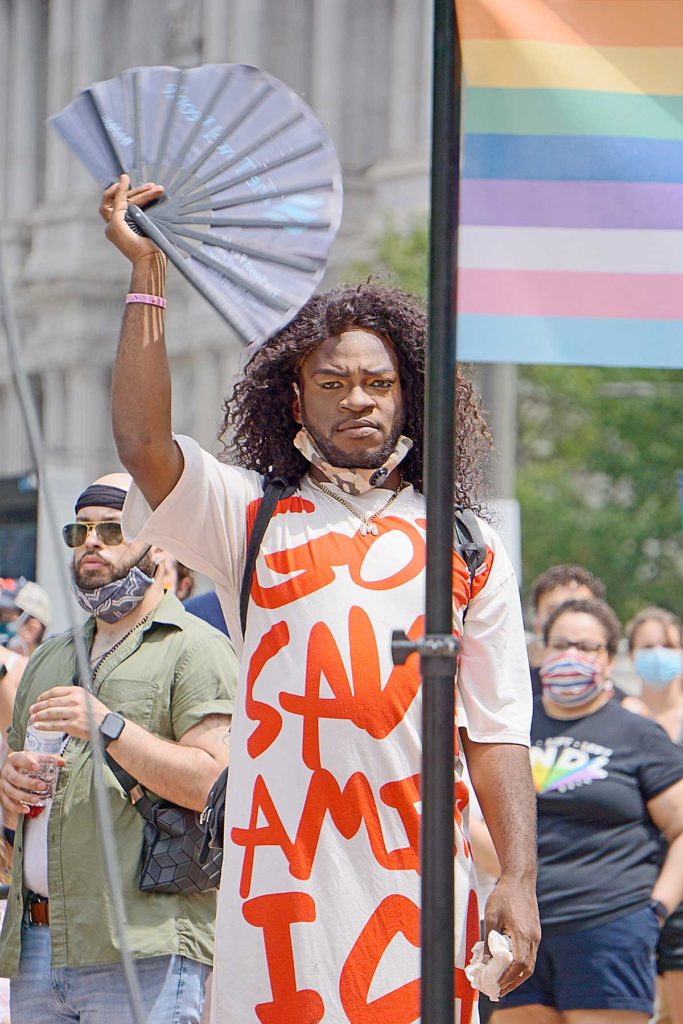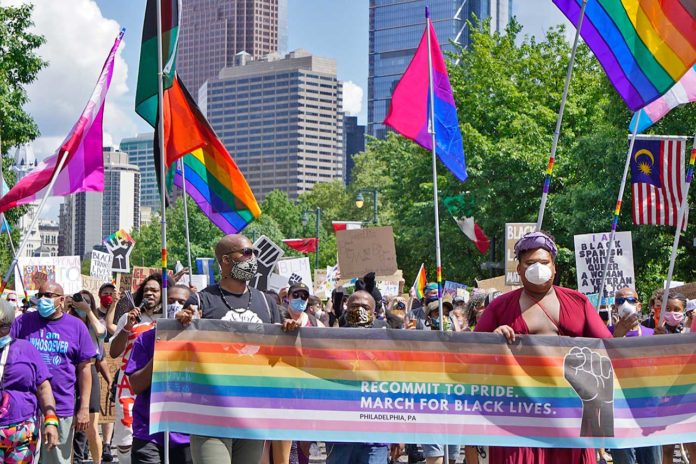Despite the heat and humidity, a diverse crowd of hundreds gathered in Love Park on Sunday, June 21, for the Philly Queer March for Black Lives. In wake of nationwide Black Lives Matter protests, the event was rapidly organized by Liberty City Democratic Club and hosted by myriad LGBTQ organizations such as Philadelphia Black Pride, Philadelphia Family Pride, Philadelphia Dyke March, Galaei, The Attic Youth Center, William Way LGBT Community Center, Penn LGBT Center, Philadelphia LGBTQ Bar Association, and ACT UP Philadelphia.
Bottled water and masks were made readily available through donations by LGBTQ health organizations Mazzoni Center, FIGHT, and Mosaic Medical. The event kicked off with MC Icon Ebony Fierce, a Black trans woman and drag performer. Several powerful Black queer speakers followed including Tyunique Nelson, VinChelle, Miyanna Brooks, and Asa Khalif.
“Black trans lives matter,” declared Nelson, the afternoon’s second speaker, “Black nonbinary lives matter, Black lives matter!” These sentiments were echoed by Liberty City’s Tariem Burroughs and Gregory O. Yorgey-Girdy who spoke to PGN about why a march like this was needed.
The march was conceived as a platform to increase awareness around LGBTQ Black lives and the violence perpetrated against them, according to Yorgey-Girdy, who recalled the marchers chanting “Say her name: Rem’mie Fells!” and “Say his name: Tony McDade!” Marchers also held signs with the names of Black trans people killed in the last two months: Fells, McDade, Riah Milton and Nina Pop.
Spreading awareness was key on Sunday. Burroughs noted that the event was not a Pride march, but a march for visibility. Yorgey-Girdy then chimed in that the two often go hand-in-hand.

“Pride is when we are united as one,” Yorgey-Girdy said. “To me, that says Pride more than blowing a whistle or throwing glitter. When you come out, sometimes your family will disown you. Within the community, we call each other family. I think this event, what happened yesterday, clearly shows what family means. It was a beautiful thing to see and it was really moving to me.”
Celena Morrison, executive director of the City’s Office of LGBT Affairs, also highlighted the idea of unity. “It was great to see the queer community show up in support of Black trans women. The March shed light on an epidemic of violence waged against Black transgender people, but there is still much work to be done. Until we start implementing real change, transgender and gender non-conforming people will continue to face disproportionate and fatal violence.”
With a powerful closing speech from Asa Khalif, a Black Lives Matter organizer, the crowd rallied behind streaming Pride flags and marched up the boulevard toward the Philadelphia Art Museum. Everyone marched behind a banner that read: “Recommit to Pride. March for Black Lives.” Burroughs and Yorgey-Girdy affirmed that the slogan for the banner was the product of many discussions within the sub-committees. Those at Liberty City are currently trying to petition William Way to get the banner archived as an important piece of LGBTQ history.
Burroughs and Yorgey-Girdy also highlighted a key person behind the scenes: Ted Bordelon, a queer white ally of the movement and the one who got the ball rolling for the march itself. Burroughs used Bordelon as an example for other white allies to follow.
“He didn’t just ask, ‘How are you?’” said Burroughs, “he asked, ‘What can I do?’”
Ultimately, Burroughs said, white allies can listen and generate plans of action to elect more Black queer members to their organizational boards and share the voice of influence. Liberty City formed a Black Caucus with queer folks from the community, and the city has implemented an LGBTQ Black board leadership program that enables Black queer people to sit on community boards.
“We need to be in positions of leadership,” Burroughs said, “but we also need to be in other positions as well. Because you can’t always lead from the front. Sometimes you have to lead from the back. Each position within an organization is important in its own way.”
Burroughs concluded by saying that there need to be more events like the Philly Queer March for Black Lives to bring attention not only to the violence against Black queer bodies, but also to the lack of representation of Black LGBTQ people within politics, community organizations, and in business.
